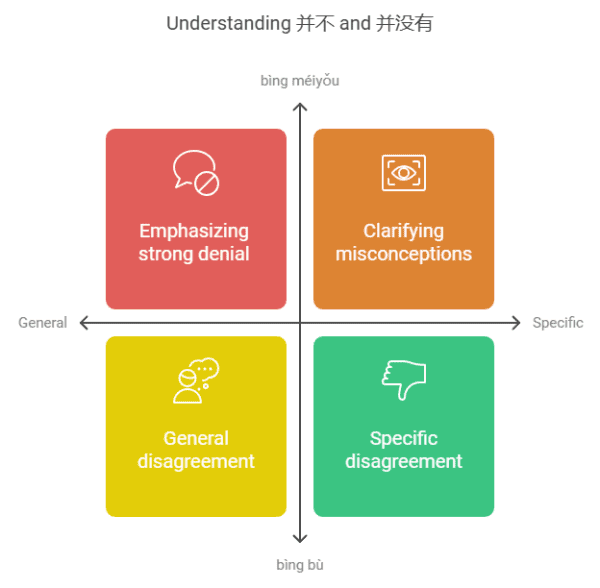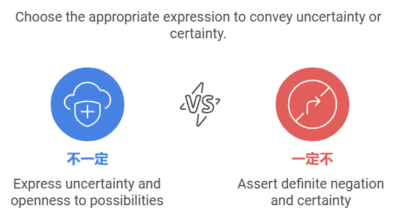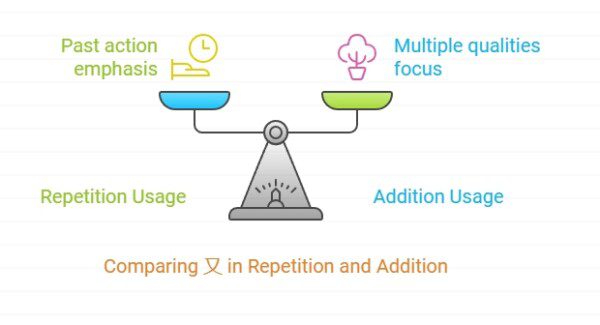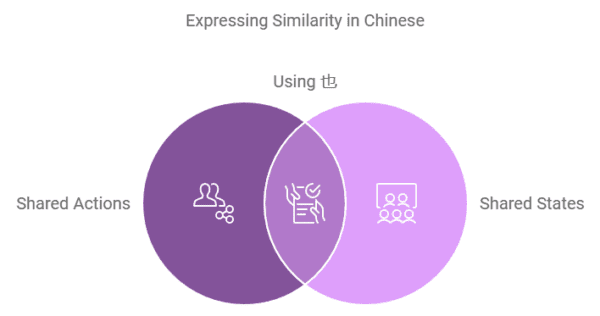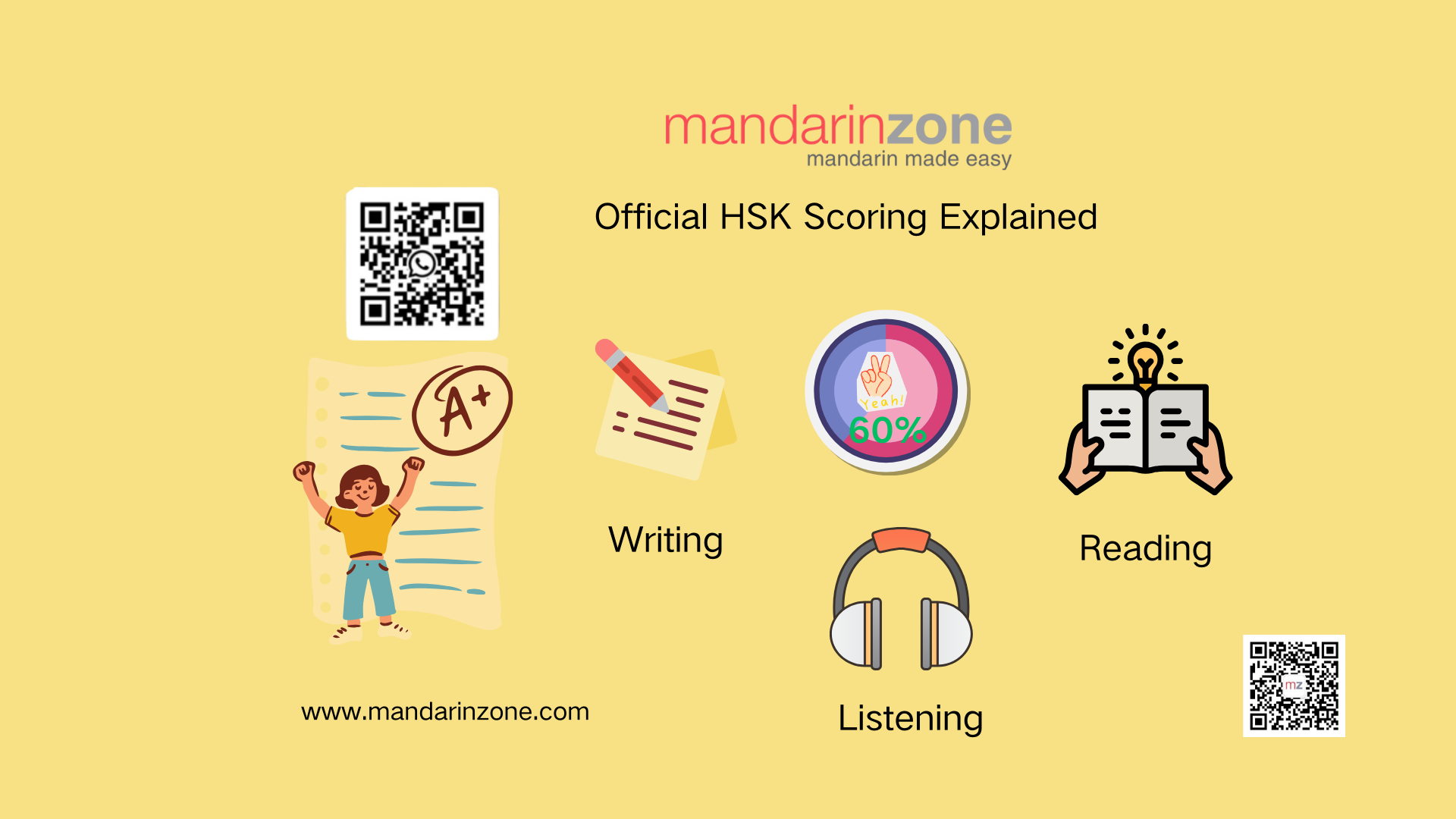Mastering HSK 4 Grammar: In-Depth Guide to 并不, 并没有, 不一定, 不见得, 又 , 还, and 也
Learning Chinese grammar at the HSK 4 level is a significant step for Mandarin learners. At this stage, understanding the subtle differences between similar expressions becomes crucial. This guide focuses on key grammar points such as 并不 (bìng bù), 并没有 (bìng méiyǒu), 不一定 (bù yídìng), 不见得 (bù jiànde), 又 (yòu), 还 (hái), and 也 (yě). By mastering these expressions, you’ll enhance your ability to convey emotions, attitudes, and nuanced meanings in Chinese, aligning with the requirements of HSK 4 grammar.
- 并不 / 并没有 (bìng bù / bìng méiyǒu) — Emphasizing Strong Negation
- 不一定 (bù yídìng) — Expressing Uncertainty
- 不见得 (bù jiànde) — Conveying Mild Skepticism
- 又 (yòu) — Indicating Repetition or Addition
- 还 (hái) — Denoting Continuation or Addition
- 也 (yě) — Expressing Similarity or Inclusion
- Comparing Similar Grammar Points and Avoiding Common Mistakes
- Cultural Insights
- Practice Exercises with Answers
- Conclusion
- Learn Chinese in Beijing at Mandarin Zone School
- HSK 4 Grammar Online Exercise Series 2
并不 / 并没有 (bìng bù / bìng méiyǒu) — Emphasizing Strong Negation
Meaning
- 并不 (bìng bù): “Not at all,” “definitely not.”
- 并没有 (bìng méiyǒu): “Did not at all,” “definitely did not.”
These expressions are used to strongly deny or refute a statement or assumption. They emphasize the speaker’s firm stance and are often used to correct misunderstandings or rumors.
Usage
- Structure:
- 并不 + Verb/Adjective
- 并没有 + Verb Phrase
- When to Use:
- To express strong disagreement or denial.
- To clarify a misconception.
- To emphasize that something is absolutely not the case.
- Examples:
- 我并不累。
- Wǒ bìng bù lèi.
- Translation: “I am not tired at all.”
- Usage: Denying someone’s assumption that you are tired.
- 他们并没有告诉我这个消息。
- Tāmen bìng méiyǒu gàosu wǒ zhège xiāoxi.
- Translation: “They did not tell me this news at all.”
- Usage: Emphasizing that you were not informed.
- 她并不喜欢吃辣的食物。
- Tā bìng bù xǐhuan chī là de shíwù.
- Translation: “She doesn’t like spicy food at all.”
- Usage: Correcting someone who thinks she does.
- 我并不累。
Common Mistakes and How to Avoid Them
- Mistake 1: Omitting 并 when emphasizing negation.
- Incorrect: 我不喜欢这个电影。
- Correct: 我并不喜欢这个电影。
- Explanation: Adding 并 strengthens the negation.
- Mistake 2: Misplacing 并 in the sentence.
- Incorrect: 我不并喜欢这本书。
- Correct: 我并不喜欢这本书。
- Explanation: 并 should come before 不 or 没有.
- Tip: Use 并不 and 并没有 when you want to strongly deny or refute something, not for general negations.
Cultural Insight
In Chinese communication, using 并不 and 并没有 adds emphasis to your denial, which can be seen as assertive. Be mindful of the context to ensure that your response is appropriate and not perceived as overly strong or confrontational.
不一定 (bù yídìng) — Expressing Uncertainty
Meaning
“Not necessarily,” “may not,” “not certain.”
This expression is used to indicate that something is uncertain or may not happen as expected. It introduces doubt or a possibility that the outcome could be different.
Usage
- Structure: Subject + 不一定 + Verb Phrase
- When to Use:
- To express that something is possible but not guaranteed.
- To temper expectations.
- To suggest alternative possibilities.
- Examples:
- 他不一定会来。
- Tā bù yídìng huì lái.
- Translation: “He may not come.”
- Usage: Indicating uncertainty about his attendance.
- 努力不一定会成功,但不努力一定不会成功。
- Nǔlì bù yídìng huì chénggōng, dàn nǔlì yídìng bú huì chénggōng.
- Translation: “Hard work may not necessarily lead to success, but without hard work, there will definitely be no success.”
- Usage: Discussing the uncertainties of success.
- 最贵的东西不一定是最好的。
- Zuì guì de dōngxi bù yídìng shì zuì hǎo de.
- Translation: “The most expensive things are not necessarily the best.”
- Usage: Expressing that price doesn’t guarantee quality.
- 他不一定会来。
Common Mistakes and How to Avoid Them
- Mistake 1: Confusing 不一定 with 一定不.
- 不一定 means “not necessarily,” indicating uncertainty.
- 一定不 means “definitely not,” indicating certainty in negation.
- Incorrect: 他一定不来。 (When you mean he may not come.)
- Correct: 他不一定来。
- Explanation: Use 不一定 to express uncertainty.
- Tip: Remember that 不一定 introduces doubt, whereas 一定不 asserts a definite negation.
Cultural Insight
Chinese culture often values humility and avoiding absolute statements. Using 不一定 allows the speaker to express opinions or predictions without appearing overly assertive or risking being incorrect.
不见得 (bù jiànde) — Conveying Mild Skepticism
Meaning
“Not necessarily so,” “unlikely,” “may not.”
This expression conveys mild doubt or skepticism about a statement, opinion, or commonly held belief. It’s less direct than outright negation and is used to gently challenge or question.
Usage
- Structure: Subject + 不见得 + Verb Phrase
- When to Use:
- To express polite disagreement.
- To suggest that something may not be as assumed.
- To offer a different perspective.
- Examples:
- 他会说中文,但不见得能当翻译。
- Tā huì shuō Zhōngwén, dàn bù jiànde néng dāng fānyì.
- Translation: “He can speak Chinese, but that doesn’t necessarily mean he can be a translator.”
- Usage: Questioning someone’s suitability for a role.
- 这道题很简单,不见得每个人都会做。
- Zhè dào tí hěn jiǎndān, bù jiànde měi gè rén dōu huì zuò.
- Translation: “This question is simple, but not everyone can solve it.”
- Usage: Pointing out that simplicity doesn’t guarantee success.
- 他看起来很友好,但不见得值得信任。
- Tā kàn qǐlái hěn yǒuhǎo, dàn bù jiànde zhídé xìnrèn.
- Translation: “He seems friendly, but he may not be trustworthy.”
- Usage: Expressing caution about appearances.
- 他会说中文,但不见得能当翻译。
Common Mistakes and How to Avoid Them
- Mistake 1: Using 不见得 in situations requiring strong negation.
- Incorrect: 他犯了错,不见得需要道歉。
- Correct: 他犯了错,应该道歉。
- Explanation: 不见得 is too mild here; use a stronger statement if necessary.
- Tip: Use 不见得 when you want to gently challenge or express skepticism without being confrontational.
Cultural Insight
In Chinese etiquette, being indirect can be a way to maintain harmony and avoid embarrassment. 不见得 allows you to express disagreement subtly, aligning with cultural preferences for indirect communication.
又 (yòu) — Indicating Repetition or Addition
Meaning
“Again,” “both… and…,” “in addition.”
又 is used to indicate that an action has occurred again or to connect multiple adjectives or verbs describing a subject.
Usage
- Structure for Repetition: Subject + 又 + Verb + 了
- Structure for Addition: 又 + Adjective 1 + 又 + Adjective 2
- When to Use:
- To express that something has happened again (usually in the past).
- To describe multiple qualities or actions of a subject.
- Examples (Repetition):
- 他又迟到了。
- Tā yòu chídào le.
- Translation: “He is late again.”
- Usage: Indicating repeated lateness.
- 天气预报说今天又要下雨了。
- Tiānqì yùbào shuō jīntiān yòu yào xià yǔ le.
- Translation: “The weather forecast says it will rain again today.”
- Usage: Expressing recurrence of rain.
- 他又迟到了。
- Examples (Addition):
- 这个苹果又大又甜。
- Zhège píngguǒ yòu dà yòu tián.
- Translation: “This apple is big and sweet.”
- Usage: Describing multiple qualities.
- 她又聪明又努力。
- Tā yòu cōngmíng yòu nǔlì.
- Translation: “She is both smart and hardworking.”
- Usage: Praising someone’s attributes.
- 这个苹果又大又甜。
Common Mistakes and How to Avoid Them
- Mistake 1: Confusing 又 with 再 (zài).
- 又 is used for past actions that have happened again.
- 再 is used for future actions that will happen again.
- Incorrect: 明天他又来。
- Correct: 明天他再来。
- Explanation: Use 再 for future repetition.
- Mistake 2: Misplacing 又 in additive sentences.
- Incorrect: 她聪明又努力。
- Correct: 她又聪明又努力。
- Explanation: 又 should precede each adjective.
- Tip: Remember that 又…又… is used to connect adjectives or verbs, emphasizing that the subject possesses multiple qualities or actions.
Cultural Insight
Using 又…又… to describe someone positively is common in Chinese compliments. It reflects the cultural value placed on well-roundedness and balance in personal attributes.
还 (hái) — Denoting Continuation or Addition
Meaning
“Still,” “also,” “in addition.”
还 is used to indicate that an action or state is ongoing or to add information about the subject.
Usage
- Structure (Continuation): Subject + 还 + 在 + Verb
- Structure (Addition): Subject + 还 + Verb Phrase
- When to Use:
- To express that something is continuing.
- To add another point or piece of information.
- To indicate that more is to be said about the subject.
- Examples (Continuation):
- 他还在睡觉。
- Tā hái zài shuìjiào.
- Translation: “He is still sleeping.”
- Usage: Noting that the action hasn’t stopped.
- 我们还需要更多时间。
- Wǒmen hái xūyào gèng duō shíjiān.
- Translation: “We still need more time.”
- Usage: Expressing an ongoing need.
- 他还在睡觉。
- Examples (Addition):
- 她会说中文,还会说日语。
- Tā huì shuō Zhōngwén, hái huì shuō Rìyǔ.
- Translation: “She can speak Chinese and also Japanese.”
- Usage: Adding information about her language skills.
- 这个手机很便宜,还很好用。
- Zhège shǒujī hěn piányi, hái hěn hǎo yòng.
- Translation: “This phone is cheap and also easy to use.”
- Usage: Highlighting additional benefits.
- 她会说中文,还会说日语。
Common Mistakes and How to Avoid Them
- Mistake 1: Confusing 还 with 再.
- 还 implies continuation of the current state.
- 再 suggests repetition in the future.
- Incorrect: 他再在睡觉。
- Correct: 他还在睡觉。
- Explanation: Use 还 for ongoing actions.
- Mistake 2: Misplacing 还 in the sentence.
- Incorrect: 他在还睡觉。
- Correct: 他还在睡觉。
- Explanation: 还 comes before 在.
- Tip: Use 还 when emphasizing that something is still happening or when adding new information about the subject.
Cultural Insight
In Chinese culture, patience and endurance are valued traits. Using 还 to describe ongoing actions can reflect these cultural attitudes toward persistence and continuation.
也 (yě) — Expressing Similarity or Inclusion
Meaning
“Also,” “too,” “as well.”
也 is used to indicate that the same applies to another subject or to show agreement.
Usage
- Structure: Subject + 也 + Verb Phrase
- When to Use:
- To express that someone else shares the same action or state.
- To add yourself or another subject to a previously mentioned action.
- Examples:
- 我也喜欢吃中国菜。
- Wǒ yě xǐhuan chī Zhōngguó cài.
- Translation: “I also like eating Chinese food.”
- Usage: Expressing shared preference.
- 他们也去了那个地方。
- Tāmen yě qù le nàgè dìfang.
- Translation: “They also went to that place.”
- Usage: Indicating that others did the same.
- 如果你去,我也去。
- Rúguǒ nǐ qù, wǒ yě qù.
- Translation: “If you go, I’ll go too.”
- Usage: Showing willingness to join.
- 我也喜欢吃中国菜。
Common Mistakes and How to Avoid Them
- Mistake 1: Placing 也 incorrectly.
- Incorrect: 我喜欢也看电影。
- Correct: 我也喜欢看电影。
- Explanation: 也 should come after the subject and before the verb.
- Mistake 2: Overusing 也 where 还 or 而且 (érqiě) might be more appropriate.
- Incorrect: 他会说中文,也会说日语。
- Correct: 他会说中文,还会说日语。
- Explanation: 还 adds new information; 也 suggests similarity.
- Tip: Use 也 to express similarity between subjects, ensuring it is placed correctly in the sentence.
Cultural Insight
Collectivism is a key aspect of Chinese culture. Using 也 reflects the sense of community and shared experiences, emphasizing commonalities between people.
<id=”comparing-grammar”>Comparing Similar Grammar Points and Avoiding Common Mistakes
并不 vs. 不一定 vs. 不见得
- 并不 (bìng bù): Strong denial; “definitely not.”
- Usage: To refute or correct; emphasizes the negation.
- Mistake to Avoid: Using 并不 when expressing uncertainty.
- 不一定 (bù yídìng): Uncertainty; “not necessarily.”
- Usage: To suggest possibilities; expresses doubt.
- Mistake to Avoid: Confusing with 一定不 (definitely not).
- 不见得 (bù jiànde): Mild skepticism; “may not.”
- Usage: To gently challenge or express doubt.
- Mistake to Avoid: Using it for strong negation.
How to Choose:
- Use 并不 when you are certain that something is not the case.
- Use 不一定 when you’re expressing that something might or might not happen.
- Use 不见得 when you slightly doubt a statement or common belief.
又 vs. 还 vs. 也
- 又 (yòu): Repetition (past); “again,” “both… and…”
- Usage: Past actions happening again; combining adjectives.
- Mistake to Avoid: Using 又 for future actions (再 is used for future).
- 还 (hái): Continuation; “still,” “also.”
- Usage: Ongoing actions; adding information.
- Mistake to Avoid: Confusing with 再 or misplacing in the sentence.
- 也 (yě): Similarity; “also,” “too.”
- Usage: Expressing that the same applies to another subject.
- Mistake to Avoid: Incorrect placement; overusing in additive contexts.
How to Choose:
- Use 又 for actions that have occurred again in the past or to connect adjectives.
- Use 还 to indicate that something is still happening or to add additional information.
- Use 也 when expressing that another subject shares the same action or state.
甚至 (shènzhì) vs. 连……也/都 (lián… yě/dōu)
- 甚至 (shènzhì): “Even” (to the extent that).
- Usage: Highlights an extreme or unexpected case.
- Mistake to Avoid: Using 甚至 without proper context or emphasis.
- 连……也/都 (lián… yě/dōu): “Even” (including).
- Usage: Emphasizes that even the least expected subject is included.
- Mistake to Avoid: Forgetting to include 也 or 都 in the structure.
How to Choose:
- Use 甚至 to emphasize the extent of something, often in surprising situations.
- Use 连……也/都 to include an unexpected subject in a group.
Cultural Insights
The Role of Modesty and Indirectness
Chinese culture places a high value on modesty and indirect communication. Expressions like 不一定 and 不见得 allow speakers to express uncertainty or skepticism without causing offense. Being too direct or assertive can be seen as impolite.
- Example: Using 不见得 to gently challenge someone’s opinion shows respect for their viewpoint while expressing your own.
Emphasis on Community and Shared Experiences
Using 也 and 还 reflects the collectivist nature of Chinese society, highlighting similarities and shared activities. It’s common to emphasize what we have in common rather than differences.
- Example: Saying 我也去 (“I’m going too”) fosters a sense of unity.
The Importance of Context in Communication
Understanding when to use certain expressions depends heavily on the context and the relationship between speakers. Recognizing these subtleties is key to effective communication in Chinese.
- Example: Using 并不 in a formal setting might be too strong; opting for a softer expression like 不太 could be more appropriate.
Practice Exercises with Answers
Exercise 1: Fill in the Blanks with the Appropriate Word
- 他______喜欢喝茶,也喜欢喝咖啡。
- Answer: 也
- Explanation: Expressing that both preferences apply.
- 我______相信他的话。
- Answer: 并不
- Explanation: Strongly denying belief in his words.
- 她______在办公室,等一会儿再打电话吧。
- Answer: 不一定
- Explanation: She may not be in the office.
- 今天______下雨了,真讨厌。
- Answer: 又
- Explanation: It’s raining again.
- 他工作很努力,______周末都在学习。
- Answer: 甚至
- Explanation: Even on weekends.
Exercise 2: Choose the Correct Expression
- 这件事______是真的,我们需要核实一下。a) 并不
b) 不一定
c) 还
- Answer: b) 不一定
- Explanation: Expressing uncertainty.
- 他______没有参加会议,你知道原因吗?a) 并
b) 并不
c) 并没有
- Answer: c) 并没有
- Explanation: Strongly denying his attendance.
- 我______看过这本书,再给我推荐一本吧。a) 又
b) 已经
c) 还
- Answer: b) 已经
- Explanation: Indicating completion.
Exercise 3: Correct the Mistakes in the Sentences
- 他明天又来参加会议。
- Correction: 他明天再来参加会议。
- Explanation: Use 再 for future actions.
- 我不一定不会去旅行。
- Correction: 我不一定会去旅行。
- Explanation: Remove double negatives for clarity.
- 她并喜欢这个礼物。
- Correction: 她并不喜欢这个礼物。
- Explanation: Include 不 to complete the negation.
Conclusion
By mastering these key HSK 4 grammar points, you enhance your ability to express complex emotions and nuanced meanings in Chinese. Understanding the subtle differences between expressions like 并不, 不一定, 不见得, 又, 还, and 也 is essential for effective communication and aligns with the proficiency required at this level.
Remember to consider cultural contexts and common usage to avoid mistakes and to communicate respectfully and effectively.
Learn Chinese in Beijing at Mandarin Zone School
Ready to take your Chinese to the next level? Mandarin Zone School in Beijing offers personalized courses to help you master HSK level 4 grammar points and beyond.
Why Choose Mandarin Zone School?
- Empowering Global Learners Across Industries: Tailored programs for professionals and students.
- Trusted by Embassies and Multinationals: Recognized excellence in language education.
- Expert Instructors, Personalized Learning: Experienced teachers focused on your success.
Why Learn Chinese in Beijing?
- Study in the Birthplace of Standard Mandarin: Immerse yourself in the language where it originated.
- Practice Chinese in Real-Life Situations: Engage with native speakers daily.
- Experience Rich Chinese Culture: Enhance your understanding through cultural immersion.
- Be at China’s Cultural and Political Center: Benefit from the vibrant environment of Beijing.
Visit mandarinzone.com to start your Mandarin journey today!
HSK 4 Related Useful Articles
Mastering HSK 4 Grammar Point 差不多, 差点, 几乎, 正好, 只好
Free HSK 4 Grammar Online Quiz
HSK Level 4-All You Need To Know About HSK 4
HSK 4 Vocabulary List + Excel and PDF (with 3 Free Quiz Sheets)


